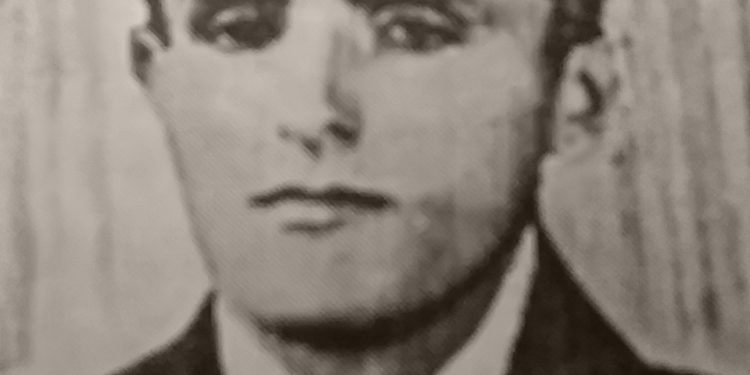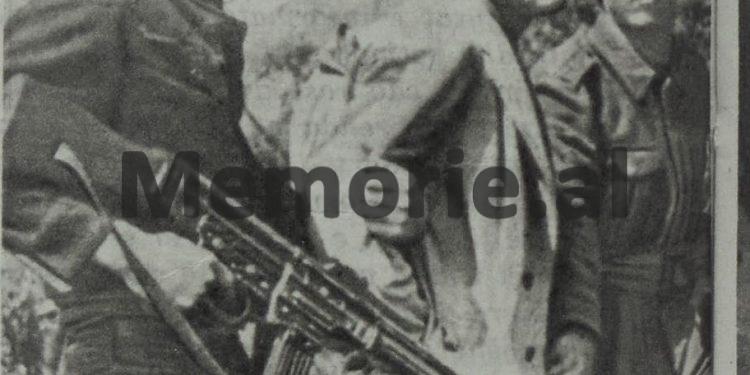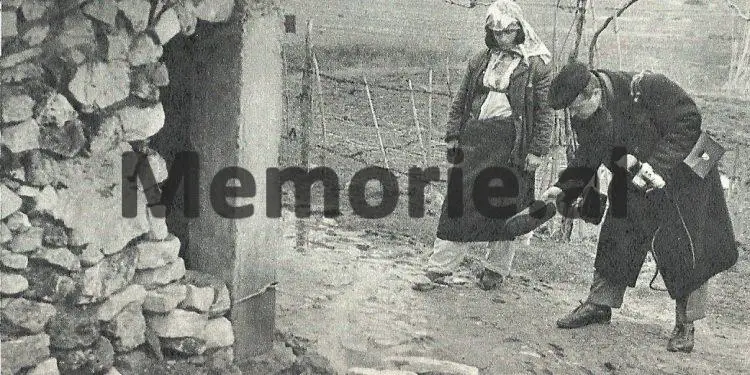By Caf Jonuz Çulaj
Memorie.al/ Bzheta is a mountain village and is part of Shkrel, about 40 km. from Shkodra. The land is scarce and without water, while drinking water is taken away. Its inhabitants are mainly engaged in livestock. One of the families of this village that had to be fed from the production, was that of Pashko Bruçaj. Many people own little property. The seven children you had to feed on produce that could yield 3 acres of land on water that had a few small cattle heads.
His eldest son was Deda. Pashkoja saw him grow up and said to him: “Hey, de, grow faster, to help me at work”. The point was to provide bread, because for others it seemed “early” to pretend.
Deda received only primary education, as the 7-year-old was later realized in his village. But even though he received the other lessons he needed in life from his father, as is usually the case in deep mountainous areas.
In 1956, Deda returned from the army, which had burned him even more. In a collective life man learns a lot. Such is the army, such is the prison.
The village was collectivized, the income in lek and in products was very small. True the village was poor, but thus poverty was not proven. It was collective poverty and people seemed to get used to it.
The reasonable source of livelihood was employment in state jobs (forestry, trade, construction, etc.) but this was the property of a select few.
Within the agricultural cooperative, the work in extracting timber was the most profitable. He managed to work in this sector. Every day he climbed into the forest with an ax in his hand, with a small shot of cornbread and some food. Usually a beech would sit on a tree and eat what it had in the shade.
One day he saw a man dressed in military clothes sitting on a mountain trail, but without rank and he saw the five-pointed star in his hat. He had a machine gun in his arm and a pistol in his belt. Deda had served in the army and knew the weapons that the Albanian army had. The arms of the person approaching him were somewhat different.
-Are you a man – said the man
As usual, Deda replied:
-Let’s go, man!
They shook hands and sat down. Deda approached the food he had in front of him, and the newcomer lay down as if he were at home and ate it full of taste, he seemed to be hungry.
Then the conversation continued, the guest asked Deda who he belonged to, and when he found out that he was the son of Pashko Bruçaj, he stood up and told him that they were related, and introduced himself:
-I’m Zef Marku.
Deda was surprised, he had heard that he had escaped in time, that he came in and out and that the bullet did not catch him. Zefi told him that he lived in Podgorica, Montenegro, and that his mission was to hasten the overthrow of communist rule in Albania. He also told him the odyssey of crossing the border many times and the efforts he had made with the State Security.
We talked at length, especially about the international situation that seemed, according to Zefi, in the High-Level Conference to be held in Paris, Albania would also be discussed. So, according to Zefi, the hopes were great for the future of the Albanian people.
They decided to meet from time to time. Zefi would bring tracts and Deda would distribute them. It would also collect military and economic data and did so for several years.
In 1960, 81 communist and workers’ parties would gather in Moscow, where Albania would also be represented. Many hoped that the course followed by the ALP would change and relations with the West would soften, and the economic situation of the people would improve. But this did not happen, as Enver Hoxha severed ties with the Soviet Union and became associated with China. The Albanian course did not change and hopes faded.
It was at this time that Deda was arrested and called by the investigation “big fish”. But Deda did not speak, did not reveal anything despite the torture and the change of investigators. Although numerous witnesses were brought in, Deda did not surrender.
On the day of judgment, no one recognized him from his transfiguration by numerous tortures. The prosecutor requested the capital punishment, but the court “mitigated” and sentenced him to 25 years in prison.
The ordeal begins with various prisons and camps, and he spent most of his sentence in Burrel Prison, which was said to be “Burrel – enters and does not leave.”
The treatment here was quite wild, everything retail, bread, water, bed width. Most were suffering, ill-treatment, violence, psychological torture. There he met many people, most of whom were of broad culture.
They became his professors. Knowledge grew. He was thus intellectually formed, tue became a teacher to the young prisoners who were below his level.
After completing 19 years in prison he is released. It would take 19 minutes to find out what this prison was. He was not told to get upset with his family in his hometown, after he was interned in Belsh, Elbasan, where he was assigned to work in the agricultural cooperative of that village. We are isolated from the world for another five years.
Lack of food, physical and psychological violence, did their job. There was also the State Security that continued to follow and monitor him at every step. Exile also comes. He also carried out internment, but he is still not allowed to go to his homeland.
At age 51, he dies.
He won the right to see his beloved village after his death, that is, with his eyes closed, when he was buried, in 1986. Memorie.al













